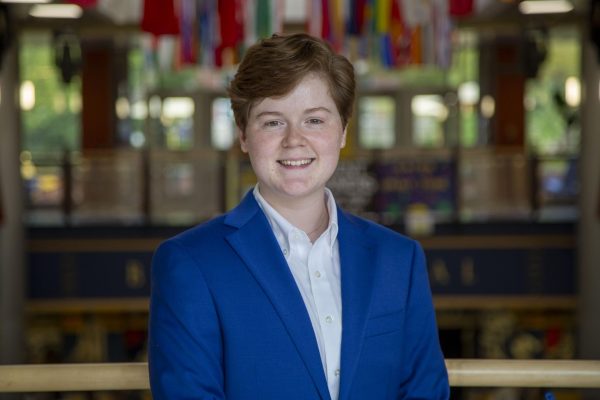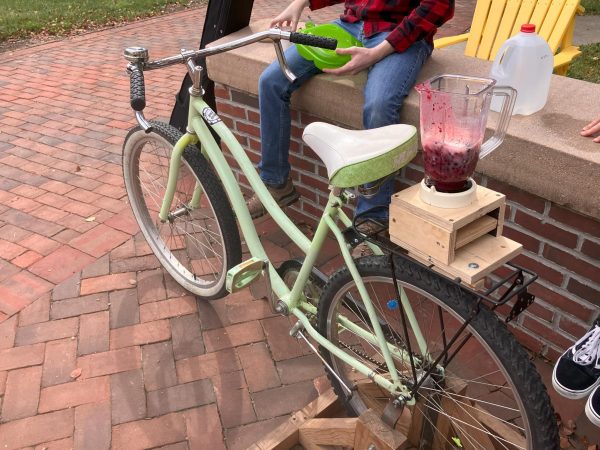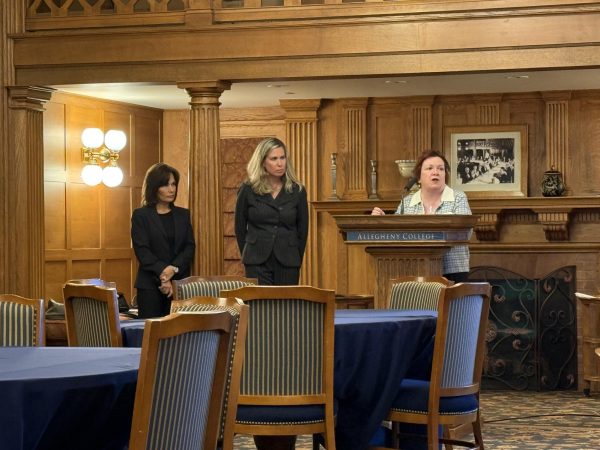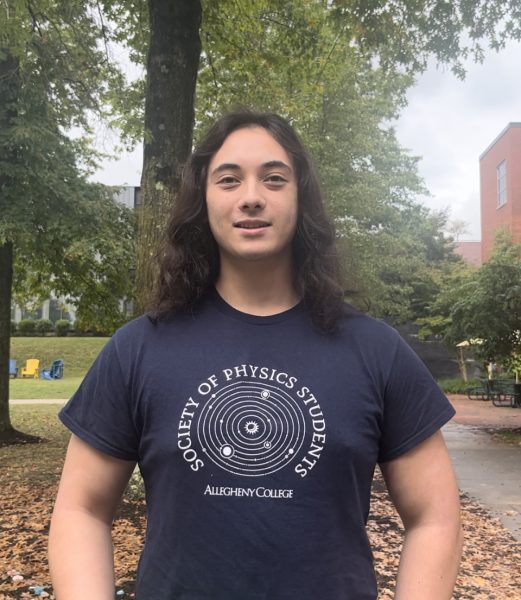A day of ‘future-ing’
‘Gator Day’ returns to form following pandemic hiatus
All classes were canceled on Tuesday, Oct. 25, for Gator Day, an annual event aimed at providing students with “valuable professional development knowledge and skills,” according to the Allegheny College website.
With over 25 different information sessions on topics ranging from academic support to community workshops to life-after-college, the 2022-23 academic year’s Gator Day offered something for everyone.
Third- and Fourth-year Class Dean Jonathan May played a lead role on the Gator Day planning committee. The committee is comprised of students, faculty, administrators and staff. They use three learning outcomes to guide their work: professional development across all class levels, student engagement with faculty and staff, and increasing students’ affinity and appreciation for Allegheny College.
May said the first learning outcome of professional development best explains the purpose of Gator Day.
“We want to have sessions that are able to help every level of student be successful in their future,” May said. “And that’s what the conference is really about. We’re also trying to give students a taste of what it’s like to attend a professional conference … (Gator Day is) a really great experience to begin to practice that professional conference etiquette for your future. I call it ‘future-ing’ — thinking about what might be the next steps for me. Whether you’re a freshman or senior, you’ve got next steps to think about.”
May said he hopes Gator Day fosters an environment for students to learn about themselves, their peers and the college.
“We want students to walk away going, ‘Wow — this school, they really care about us, I love this community, I want to be a part of this,’” May said.
May also explained the committee plans to add a fourth outcome in the coming academic years called “GTD”: Get Things Done.
“Years ago, one of the original intents of Gator Day was for students to actually have time to go to advising sessions, visit career services, go in and get financial aid counseling that students didn’t really have the time for because of their busy class schedules,” May said. “For next year, we really would love to create a central hub of services … in the (Henderson) Campus Center lobby.”
According to May, Gator Day was first implemented in the 2012-13 academic year as a response to student requests. Originally, there were two Gator Days each year — one in the fall semester and one in the spring semester. However, beginning in the 2016-17 academic year, the spring Gator Day date was replaced with a celebration of senior comprehensive projects.
May said that Gator Day “has (now) been decreed and determined that it will be an annual fall tradition ongoing forever.”
Historically, there has been some opposition to Gator Day. According to a 2016 article from The Campus, faculty and staff participated in a survey during the 2014-15 academic year to gauge the effectiveness of Gator Day events. 45% of faculty and 15% of students responded to the survey.
“An overwhelming majority of students supported Gator Day programming, while most members of faculty came out against its continuation,” The Campus reported. “A portion of the faculty reported they felt Gator Day no longer serves any purpose in the academic calendar.”
The following year, the spring Gator Day date was removed.
May said he was not aware of any current large-scale complaints from faculty.
“I will say, in my brief experience here of 9 months in my position, faculty seem really excited about Gator Day — at least, the ones I’ve interacted with,” May said. “(Faculty) really love the fact that the students have professional development going on that day, and I think they kind of recognize, too, that students need a little break in their schedule to get some things done or to work on their future.”
Additionally, May said that this year held a record-high number of submissions for faculty presentations. He interpreted this as a good sign.
Mattie Blair, ’26, attended Gator Day and said they think Gator Day provided students with valuable information.
“A lot of us kind of know what we want to do, but we don’t know exactly how to get there,” Blair said. “So I think it’s nice to be able to have the opportunity to talk to people who’ve been there and (who) have already done certain things.”
Rachael Lutz, ’24, also thought Gator Day is beneficial for students.
“I definitely like taking a day off (classes),” Lutz said. “I feel like it lets you really focus on professional development.”
Conversely, Victoria Smith, ’23, said that none of the events at Gator Day appealed to her.
“The few events oriented toward seniors were stuff that I either already knew or wasn’t going to do me any good, so I’d rather just work on homework,” Smith said.
Julia Sonen, ’24, and Smith both felt that the vast majority of Gator Day events are aimed toward first- and second-year students. Lutz agreed, but still found value in attending.
“It seems like a lot of the departmental stuff is more for (first-years) and sophomores who haven’t actually declared their major yet,” Lutz said. “But I still think there’s a fair number of things I can go to.”
Sonem did not attend Gator Day programming and opted instead to take a mental health day.
“Right now in the semester, I’m pretty overwhelmed and need to take every chance I can to take care of myself and get work done,” Sonem said.
Richard Mills, ’26, and Brooke Belfiore, ’24, also cited homework as their reason for not attending Gator Day.
May encouraged students to take advantage of future Gator Days regardless of external stressors.
“It could be really easy to go, ‘Oh, I’ll take this as a mental health day,’ or, ‘I’ll take this as a let me work on homework day,’” May said. “And all that will still be waiting for you after your Gator Day experience. But don’t miss out on valuable, potentially life-changing information because you’re worrying about the present. Doing a day of futureing could really change the direction of your life.”
Students are able to submit feedback about Gator Day year-round by emailing [email protected]. May said all of the deans within the Maytum Center for Student Success receive those emails and value student feedback.

Anna Westbrook is a junior from the Washington, D.C. area. They are majoring in Environmental Science and Sustainability with a concentration in law &...





